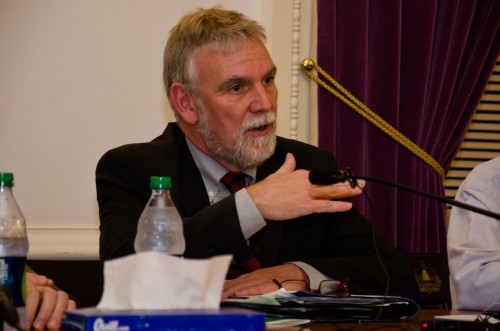 Jochen Flasbarth, president of the German Federal Environment Agency, met with government officials, the public and the media, and spoke at the Renewable Energy Vermont conference, on a visit this week to Vermont arranged by Beyond Nuclear and the Heinich Böll Foundation. Events in Brattleboro, Montpelier and Burlington were organized by local groups – Safe and Green Campaign, Citizen’s Awareness Network, Vermont Yankee Decommissioning Alliance and VPIRG. Flasbarth ,encouraged citizens and state government leaders to keep up their effort to permanently shut down the dangerous Vermont Yankee nuclear power station in March 2012. Germany is phasing out nuclear power by 2022, cutting carbon emissions and creating more renewable energy jobs in the process.
Jochen Flasbarth, president of the German Federal Environment Agency, met with government officials, the public and the media, and spoke at the Renewable Energy Vermont conference, on a visit this week to Vermont arranged by Beyond Nuclear and the Heinich Böll Foundation. Events in Brattleboro, Montpelier and Burlington were organized by local groups – Safe and Green Campaign, Citizen’s Awareness Network, Vermont Yankee Decommissioning Alliance and VPIRG. Flasbarth ,encouraged citizens and state government leaders to keep up their effort to permanently shut down the dangerous Vermont Yankee nuclear power station in March 2012. Germany is phasing out nuclear power by 2022, cutting carbon emissions and creating more renewable energy jobs in the process.
Flasbarth urged Vermonters to strengthen their feed-in tariff (Germany’s is open to all, large and small), but was encouraged by the Vermont plan to achieve 90% renewable energy by 2050, similar to Germany’s goal. Because of Germany's feed-in tariff program, 50% of all renewable energy supplied to the grid comes from farmers, home-owners and local cooperatives, Flasbarth said, with the remaining 50% from bigger commercial projects.
Flasbarth also affirmed that Germany has suffered no power shortages since shuttering the eight oldest of its 17 nuclear reactors after the Fukushima accident (the rest will be phased out by 2022) and supported efforts in the state to close Vermont Yankee on time in March 2012. He pointed out that renewable energy has created 370,000 jobs already in Germany (compared to 30,000 in the nuclear sector), including during the economic crisis. Nor have Germany’s carbon emissions increased since shutting its reactors because of the European carbon cap in the power sector. In fact, Germany continues to be a net exporter of electricity. An economist by training, Flasbarth also described how his agency’s analysis demonstrated that manufacture and implementation of renewable energy supply will be a boon to the Germany economy and that all political parties in Germany, including the most conservative, agree that there is no going back to nuclear if Germany wishes to remain a “modern” state with a vibrant economy. (Photo: VTD/Josh Larkin).